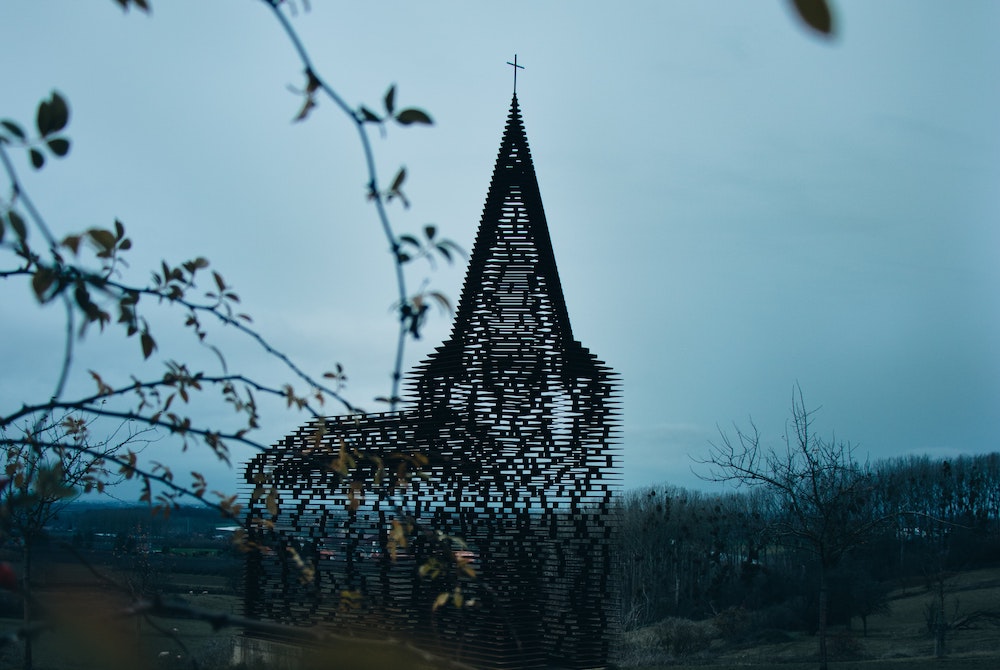
When unforeseen difficulties arise, it can be easy to get caught up in the problem at hand; this can create panic and disconnect us from our bigger goals. We need to sit down and ask: What can I do to be resilient? Are there opportunities for transformation? (Unsplash/Sharon Rosseels)

(GSR logo/Toni-Ann Ortiz)
With the comfort of evergreens, children's laughter, bayanihan and good memories — grief and fear giving way to trust — 10 panelists wrote a potpourri of short vignettes in response to this prompt:
Write a personal reflection or prayer that looks forward in hope to 2021.
______
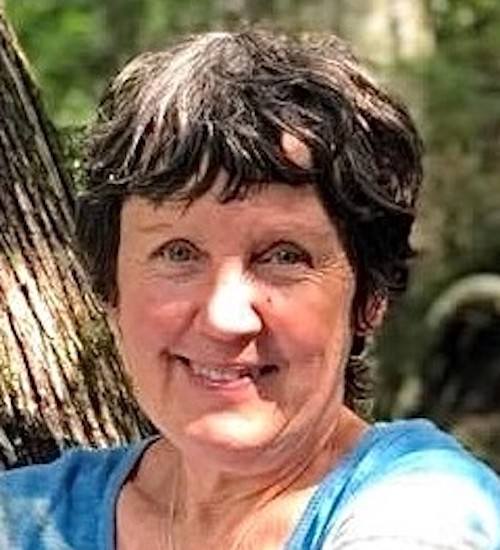 Gail Worcelo is a former Passionist Nun of St. Gabriel's Monastery who served on the leadership team and as novice director. Presently, she is the co-founder — along with Bernadette Bostwick and the late Passionist priest Thomas Berry — of an emerging community, the Sisters of the Earth Community at Green Mountain Monastery in northern Vermont. She has degrees in Christian spirituality and clinical psychology, and she studied and choreographs liturgical dance. The founder of Homecomings: Center for Ecology and Contemplation, she travels around the world giving retreats and programs to religious men and women about the Great Work and the Universe Story.
Gail Worcelo is a former Passionist Nun of St. Gabriel's Monastery who served on the leadership team and as novice director. Presently, she is the co-founder — along with Bernadette Bostwick and the late Passionist priest Thomas Berry — of an emerging community, the Sisters of the Earth Community at Green Mountain Monastery in northern Vermont. She has degrees in Christian spirituality and clinical psychology, and she studied and choreographs liturgical dance. The founder of Homecomings: Center for Ecology and Contemplation, she travels around the world giving retreats and programs to religious men and women about the Great Work and the Universe Story.
Snow Falling on my pine bough,
another year,
may it bend not break.
What has the most exquisite scent of a fresh forest? Brings joy and delight to young and old during the Christmas season? Is a sign of hope for the new year and can bend but not break under the weight of heavy snow?
The answer is the evergreen or balsam fir tree, found here on our land in the northeastern bioregion of Vermont bordering our Canadian neighbors.
We have a special relationship with this tree because it is part of our ministry of forest healing. Every year during the Christmas/new year season, we make and send close to 1,000 wreaths to families and friends across the country. During this COVID-19 time, we have received many letters of gratitude from people telling us that the intoxicating sweet fragrance and deep green beauty of our balsam wreaths hanging on their doors are a sign of hope for the new year.
Wreath-making begins by entering reverently into the great balsam cathedral with its majestic evergreen spires reaching over 18 meters high. We gently hand-harvest the branches, taking only a little from each tree. Every branch is like a hand with five balsam fingers, reminding us of the five qualities of the heart: trust, openness, gratitude, love and utmost respect.
Although impossible to send each of you a balsam wreath as a sign of hope for the year ahead, I would like to invite you, in the words of Pope Francis, into a solidarity of the heart so we can "come out of this crisis less selfish than when we went in."
Let's activate these five qualities of the heart together in the new year: trust, openness, gratitude, love and utmost respect.
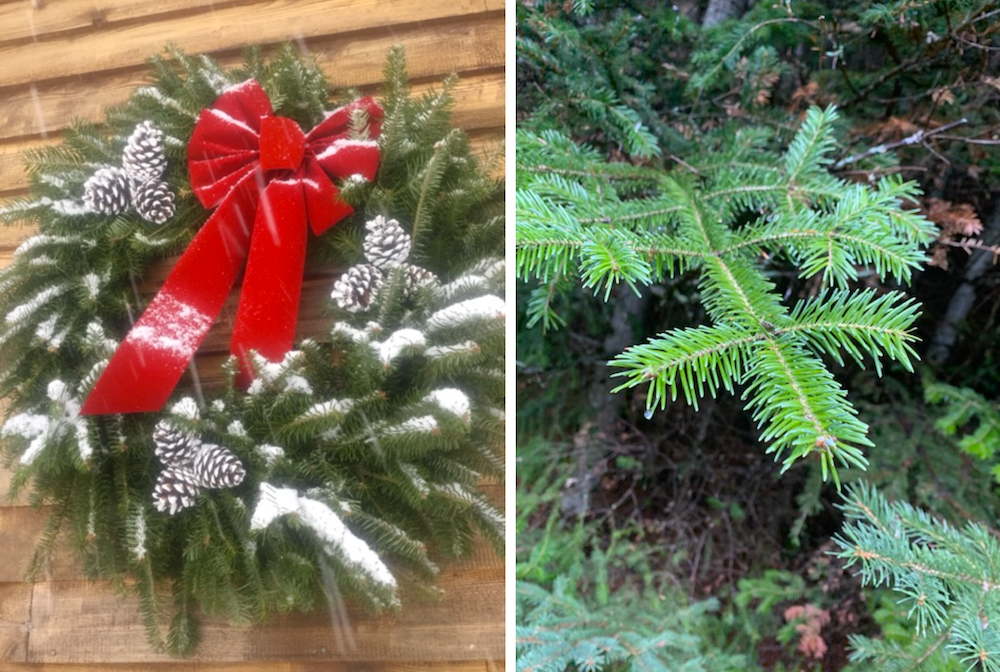
Every branch is like a hand with five balsam fingers, reminding us of the five qualities of the heart: trust, openness, gratitude, love and utmost respect. (Gail Worcelo)
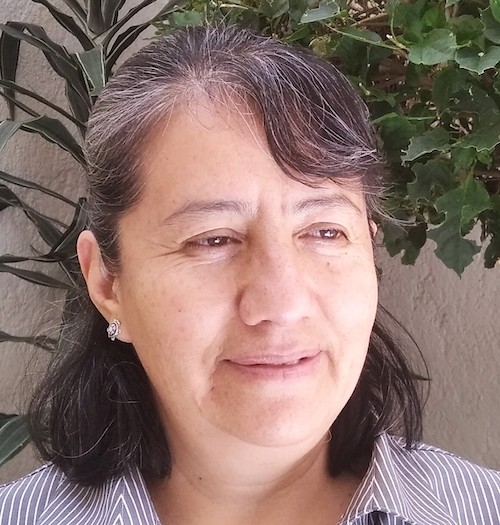 Blanca Alicia Sanchez is a sister of the Verbum Dei Missionary Fraternity in Mexico City. She received early formation and education in Guadalajara, Mexico, a licentiate in Rome, and other courses in the Philippines, Portugal, Mexico and London. A teacher of dogmatic theology and a spiritual director, she has worked in vocations, retreats, and novitiate formation. She was a formator in the international center of missionary formation in Spain and in novitiates in the Isle of Wight, United Kingdom, and Cebu, Philippines.
Blanca Alicia Sanchez is a sister of the Verbum Dei Missionary Fraternity in Mexico City. She received early formation and education in Guadalajara, Mexico, a licentiate in Rome, and other courses in the Philippines, Portugal, Mexico and London. A teacher of dogmatic theology and a spiritual director, she has worked in vocations, retreats, and novitiate formation. She was a formator in the international center of missionary formation in Spain and in novitiates in the Isle of Wight, United Kingdom, and Cebu, Philippines.
Suddenly, our missionary house was filled with the sound of laughter!
In the middle of my morning prayer, I found myself asking, "What could have happened? Why all this noise? Surely, it's a mistake!"
Usually, silence reigns throughout the morning so we can pray about all that we are living.
But it was no mistake. Our lives have changed.
At the beginning of this pandemic, I wondered if we were doing enough. We are missionaries, sent out into the world to preach the Gospel, and here, COVID-19 has us locked down. How should we respond?
Remembering this restlessness, the sound of children's laughter once again reaches my ears.
Yes, our lives have changed, our rhythm is no longer the same, for the space of our house and our hearts has expanded. In the response to COVID, our mindset has been transformed; solidarity and concern for others have been born.
Here, in Mexico City, I am witness to how parishes and communities are supporting those most affected by this pandemic. Just one example is the project that's begun in my own missionary home.
The laughter comes from children arriving to participate in their daily online classes. Since they don't have access to the internet in their own homes, the pastoral staff have given them a space on the first floor of our house, following the necessary hygiene protocols.
It may be hard to imagine that anything good could emerge from COVID, but I see hope on the horizon, for we have learned to work together as one big family. As we look forward to 2021, how beautiful it is to see that our hearts have unlimited space for others, no matter their social condition, and that in this pandemic, we have learned to widen the space of our tent.
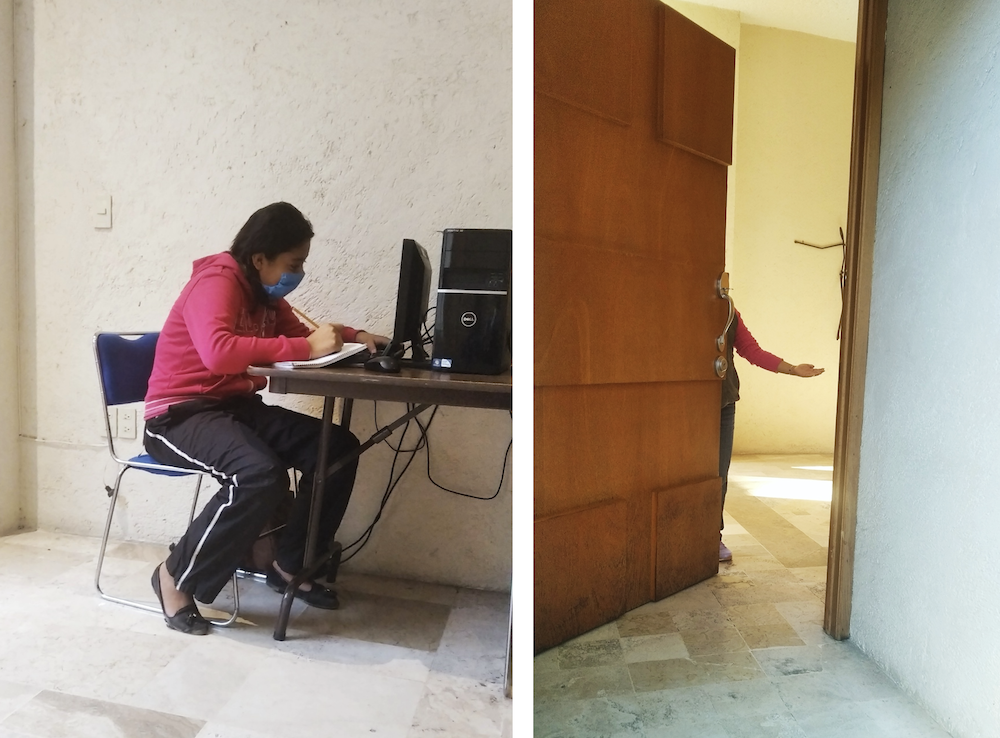
Ericka works in her online classes on the first floor of our house, following the necessary hygiene protocols. And the door of the Verbum Dei missionary house is open. (Blanca Alicia Sanchez)
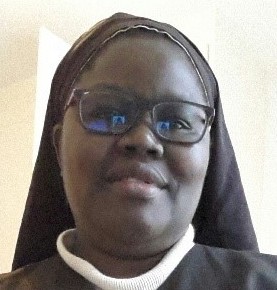 Rosemary Achien'g Oduol is a Kenyan member of the Franciscan Missionary Sisters for Africa, with a nurse/midwife background and a graduate degree in public health. She has diverse experience in ministry, including nursing education and community nursing with HIV/AIDS patients in Kenya, Uganda and Zimbabwe. She has also worked as a CEO of a mission hospital in South Sudan and as a member of her area leadership team. Presently, she is ministering at the congregational headquarters in Ireland as assistant superior general.
Rosemary Achien'g Oduol is a Kenyan member of the Franciscan Missionary Sisters for Africa, with a nurse/midwife background and a graduate degree in public health. She has diverse experience in ministry, including nursing education and community nursing with HIV/AIDS patients in Kenya, Uganda and Zimbabwe. She has also worked as a CEO of a mission hospital in South Sudan and as a member of her area leadership team. Presently, she is ministering at the congregational headquarters in Ireland as assistant superior general.
I sat down with Margret as she mourned her loss of livelihood, her husband who was killed and her house that was burned. She had been internally displaced due to the war in South Sudan. Our prayers were the tears that rolled down our cheeks; few words were uttered.
When the guns went silent, and she sought to gather a few twigs to light a fire and boil sorghum for her three little children, her face brightened. She had a purpose to live: her children. Her resolve became strong with hopes of peace as she said, "When peace comes, I will move back to my village and perform a burial rite for my husband." It is great to see such resilience and hope in the midst of life's complexity.
With hope and a sense of purpose, we will emerge from the virus transformed, with new and better practices. The arduous journey of accepting that the coronavirus has permanently transformed us has been frustrating. I find myself reiterating the same statements in turn: When the lockdown ends, our postulants will move to the novitiate, we will hold our assembly, we will do our visitations, and so forth — because the innate desire to hold on to the normal persists.
We celebrate the emergence of vaccines, and world economies are beginning to gain confidence. However, Einstein was credited for saying something along the lines of: "We can't solve problems by using the same kind of thinking we used when we created them." COVID-19 has offered us a tough lesson to learn.
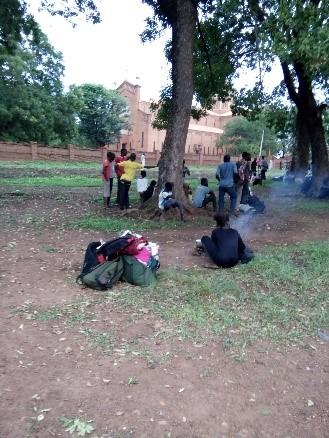
Margret in Wau, the South Sudan internally displaced persons camp in 2017 (Rosemary Achien'g Oduol)
It is critical that we address our attitudes; nature is stronger than we and can simply erase us if we overstep the mark. Our existence in the universe as human beings must be in right relationships with every other creature in the universe and the environment. Attitudes of dominance have to give way to respecting the sacredness of life in all its forms.
Rosa Ocampo is a Sister for Christian Community from Manila, Philippines. The five years she spent as a missionary in Peru and El Salvador, as well as her apostolate in the Philippine urban slums, have provided invaluable insights and experiences that helped shape her views on social justice and the preferential option for the poor. As a journalist, she currently writes for a travel trade publication in Singapore and has written for newspapers and magazines in the Philippines, Hong Kong, Singapore and Saudi Arabia.
The year 2020 has been the pits.
In January, a volcanic eruption buried communities in our country. The Philippines remains in various lockdown levels since mid-March in response to the pandemic. November typhoons claimed lives, flooded provinces, and destroyed homes and agricultural crops. Meanwhile, extrajudicial killings continued to soar, politicians managed to close the country's largest media network, massive corruption in the government was exposed, and fake news abounded.
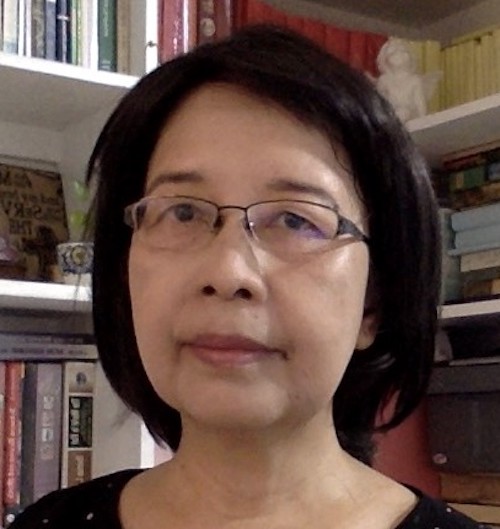 But little sparks flicker in the dark, bringers of feeble hope to this troubled land, trying to close the distance between God and his suffering people. Hardly noticed except in catastrophe and tragedy, even those who have least in life share their possessions, break bread with the hungry and open their hovels to strangers.
But little sparks flicker in the dark, bringers of feeble hope to this troubled land, trying to close the distance between God and his suffering people. Hardly noticed except in catastrophe and tragedy, even those who have least in life share their possessions, break bread with the hungry and open their hovels to strangers.
The dark times have kindled bayanihan, the Filipino tradition of the community coming together to help and care for one another. People from all walks of life donated funds to build facilities for COVID-19 patients while throngs prepared food and personal protective equipment for exhausted medical and health front line workers. Ordinary folk didn't need much prompting to help those who were stranded and to find ways to bring to the metro agricultural crops affected by the lockdown.
But while Filipinos are known for their resiliency, they're tired of being resilient and have started clamoring for accountability. That, too, is a spark of hope.
The pandemic gives us more time to pray, be still, reflect and take stock of our lives and our country's future. We are beginning to find our voice again. We respond to violence with nonviolence, to untruth by exposing the truth, injustice with justice, unbelief with faith.
These little sparks are contagious, attracting more ordinary people, celebrities, the religious, activists, Indigenous people, the wealthy and enlightened ones.
Soon, there will be enough little sparks to dispel the darkness and lead the way out of the pits. We're not hopeless.
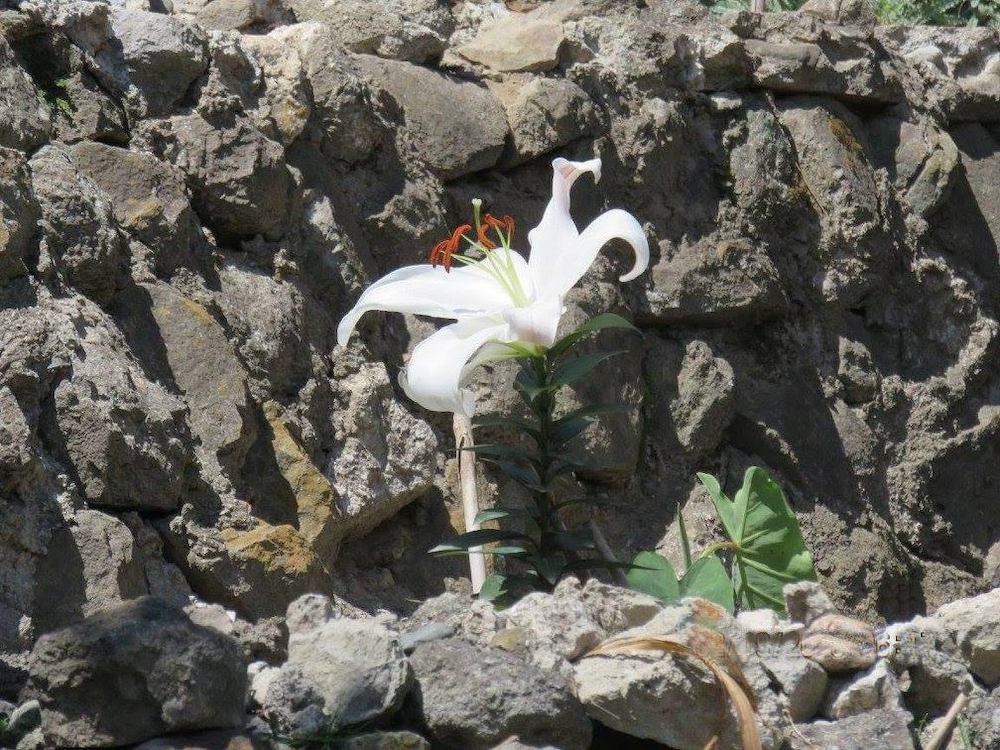
Little sparks are contagious, attracting more ordinary people, celebrities, the religious, activists, Indigenous people, the wealthy and enlightened ones. (Rosa Ocampo)
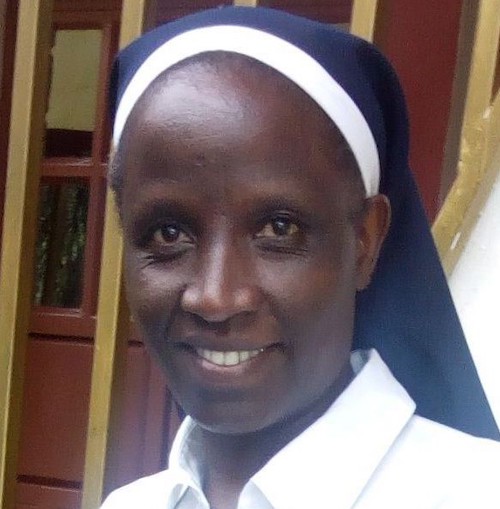 Agnes Musemba Mativo is a Kenyan member of the Religious Sisters of Mercy. Her ministries have included social work with HIV/AIDS patients in Zambia and in mission advancement at a Mercy hospital. She pursued studies in clinical psychology at the Pontifical Gregorian University in Rome and teaches psychology in two Catholic institutions. Currently, she works with men and women in formation as well as priests and religious, teaching and in psychological accompaniment. She has served as postulant mistress and continues as vocation promotor for her own congregation.
Agnes Musemba Mativo is a Kenyan member of the Religious Sisters of Mercy. Her ministries have included social work with HIV/AIDS patients in Zambia and in mission advancement at a Mercy hospital. She pursued studies in clinical psychology at the Pontifical Gregorian University in Rome and teaches psychology in two Catholic institutions. Currently, she works with men and women in formation as well as priests and religious, teaching and in psychological accompaniment. She has served as postulant mistress and continues as vocation promotor for her own congregation.
I was reading a book about the spirituality of Pierre Teilhard de Chardin by Jesuit Fr. Robert Faricy, who quoted Teilhard as saying: "God does not stand aloof from the world, somehow at a distance disinterested in the details; on the contrary, God chooses to involve Himself deeply and thoroughly in our world." These words are quite timely as the second wave of the coronavirus ravages our world.
When darkness closes in on our lives and we feel alone, we might doubt the nearness of God, like the Israelites: "For you have hidden your face from us and have delivered us up to our iniquities" (Isaiah 64:6). Just like them, we shrink with fear, worry and self-doubt. This kind of anxiety that we witnessed when the virus was at its peak denies us of inner peace that can only be achieved by embracing the sacrament of the present moment. The pandemic has had negative effects that will be felt for a long time; despite these, it is important to move on. Otherwise, we can find ourselves living in the past, forever chasing shadows that breed more inner turmoil and endless guilt that robs us of inner peace.
The pandemic reminds us that every experience we have in life never leaves us the same; there are always lessons to be learned. Perhaps we are wiser, realize we have more resilience and remember that what affects one person has ripple effects on others because we are intertwined, irrespective of our race, creed or social standards.
As we live through the second wave of COVID-19 and its new norms, like wearing masks, we must negotiate its effects with renewed inner strength and a deeper awareness that we have what it takes to live a life filled with joy, regardless of the challenges that we face.
So as we open our arms to embrace 2021, may we understand Teilhard's words: "the future is more beautiful than all the pasts."
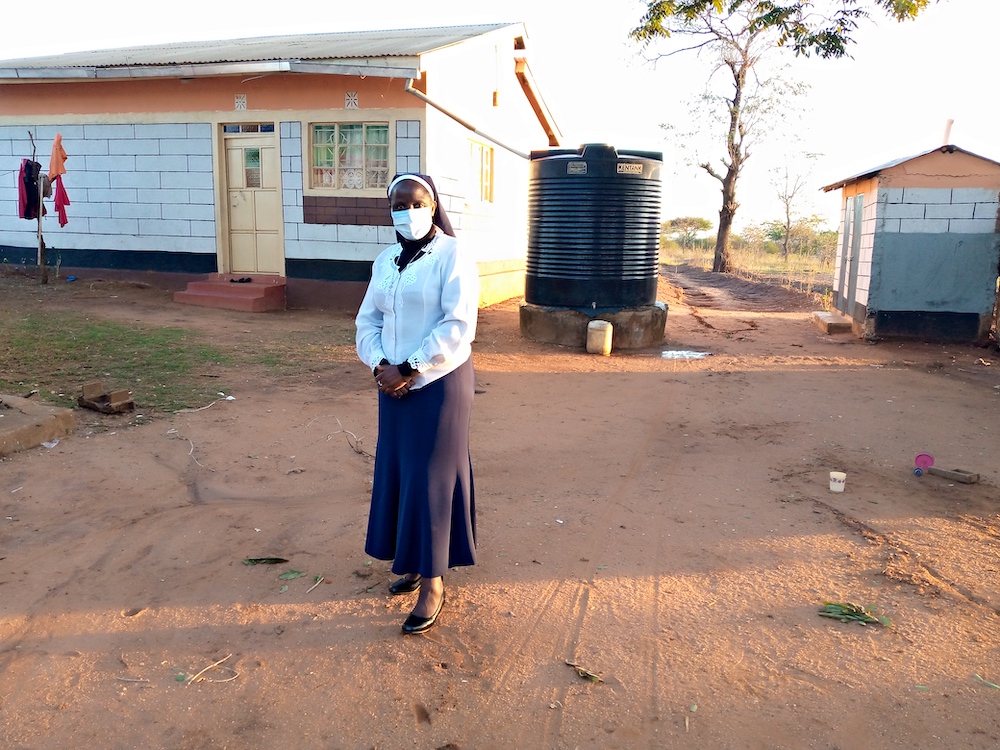
The pandemic has had negative effects that will be felt for a long time; despite these, it is important to move on. Sr. Agnes Musemba Mativo, pictured in Kenya, is used to wearing a mask. (Provided photo)
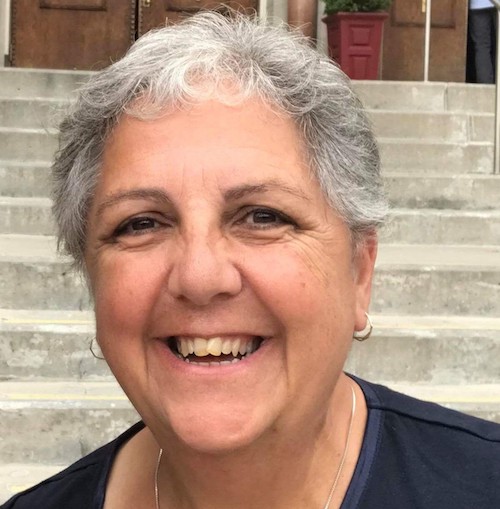 Rita Malavisi is a Sister of St. Joseph of the Sacred Heart from Melbourne, Australia, of Italian and Arabic ancestry. In Melbourne, she studied primary teaching, religious education and spiritual direction and worked in both elementary and high school education as well as parish ministry. While serving as information technology coordinator for her community, she did adult faith formation as well as pastoral care for asylum-seekers. She is currently working on a degree in pastoral studies at the Catholic Theological Union in Chicago (graduating in May 2021), while serving in her congregation's immersion and discernment of call formation group.
Rita Malavisi is a Sister of St. Joseph of the Sacred Heart from Melbourne, Australia, of Italian and Arabic ancestry. In Melbourne, she studied primary teaching, religious education and spiritual direction and worked in both elementary and high school education as well as parish ministry. While serving as information technology coordinator for her community, she did adult faith formation as well as pastoral care for asylum-seekers. She is currently working on a degree in pastoral studies at the Catholic Theological Union in Chicago (graduating in May 2021), while serving in her congregation's immersion and discernment of call formation group.
My earliest and happiest memories around this time of year are of family picnics to the beach. The ritual of Dad packing the car while my mum and nonna prepared the food for the picnic. Then off on the two-hour road trip, sometimes longer, depending on the traffic. The delight at arriving and setting up the picnic and a swim after waiting the mandatory hour after finishing lunch.
Our picnic food was multicultural — a mix of Arab and Italian, and always a cloth for the table. We'd look over to others' open barbecues, wafting the smell of the cooking of the snags, or sausages. Never a BBQ for our family.
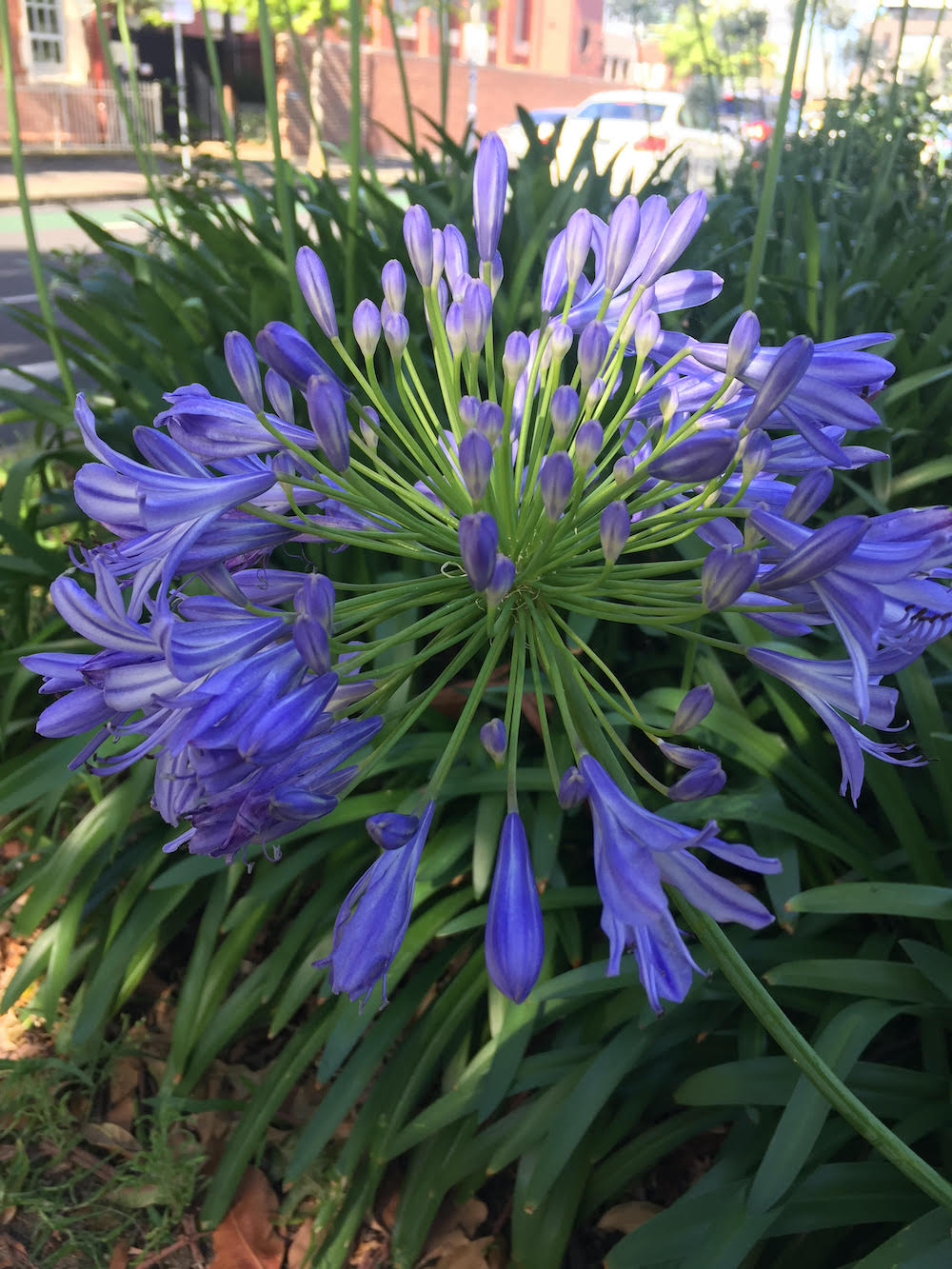
Fr. Davide Carbonaro, pastor of the Rome's Santa Maria in Campitelli parish, celebrates Mass May 18 the first day Masses with a congregation were allowed after the COVID-19 lockdown. (CNS/Stefano Dal Pozzolo)
You see, it's summer in Australia at the moment, while the northern hemisphere is shrouded in cold, winter and dark.
Rosebud, a seaside town near the bustling city where we lived, was the destination for the beach picnics. This childhood memory always contains flowers we'd see at Rosebud. We didn't know their real name then; they were round clusters of brightly colored flowers on stiff upright stalks. Their shiny sword-shaped green leaves contrasted brightly against the colour of the purple and white of the flowers.
Agapanthus was their real name, but my family called them "pajama flowers." Their name comes from the Greek agape ("love") and anthus ("flower"). Little did I know these umbels of purple and white were flowers of love. It's impossible not to love them; they are easy to grow. Isn't that what love is really like? Easy to grow.
After the year that has been, these memories of joy, love and hope lead me to trust in a God that continues to draw us into mystery. The world is still in the midst of a global pandemic. The world needs symbols of love and hope. Just like my "pajama flower," may we be able to be flowers of love to one another.
Advertisement
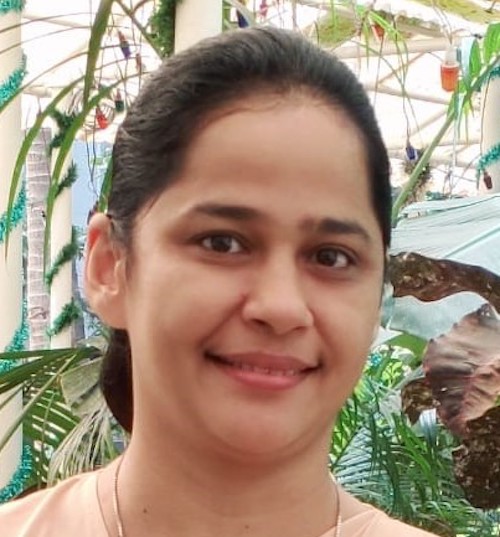 Dr. Beena Madhavath is from India, a member of the Congregation of Ursulines of Mary Immaculate. Her medical degree is in obstetrics and gynecology, and she has served as the medical superintendent, deputy director, consultant gynecologist and teacher at Holy Family Hospital in Mumbai, India. She is the provincial councilor for medical apostolate of her province, the national president of the Sister Doctors Forum of India, and a board member of the Catholic Bishops' Conference of India-Coalition for AIDS and Related Diseases and India's Christian Coalition for Health.
Dr. Beena Madhavath is from India, a member of the Congregation of Ursulines of Mary Immaculate. Her medical degree is in obstetrics and gynecology, and she has served as the medical superintendent, deputy director, consultant gynecologist and teacher at Holy Family Hospital in Mumbai, India. She is the provincial councilor for medical apostolate of her province, the national president of the Sister Doctors Forum of India, and a board member of the Catholic Bishops' Conference of India-Coalition for AIDS and Related Diseases and India's Christian Coalition for Health.
For most of us, the year 2020 was like a roller-coaster ride. There have been experiences of immense suffering. Many suffered COVID symptoms, including physical ailments and air hunger. Many lost loved ones. Even more than the pandemic, the lockdown impacted many more.
In India, many lost their livelihoods, had to walk hundreds of miles with their families to reach their villages from the cities where they worked. They went through the experience of hunger, uncertainty and helplessness. The pain of witnessing their children's hunger and suffering broke their hearts.
For others, the disruption of normal life — not being able to travel, meet, or be part of the life of church and society — also resulted in some amount of suffering and hopelessness.
However, in the midst of all this, we could also witness moments of joy, hope and the divine accompaniment in a tangible way. I vividly remember how relieved a COVID-positive mother and her family were when I delivered her twin babies through an emergency cesarean section after she had been denied admission to several hospitals. After my routine rounds the next day, I walked away from her bedside with tears of joy blurring my vision because I could see gratitude, joy and hope on their faces.
During the COVID crisis, we witnessed several individual and organized expressions of goodness, solidarity, interconnectedness and love of neighbor. It also became an opportunity for prayer and introspection, reconnecting with God and community. Indeed, the pandemic has in many ways ignited and paved new pathways and breakthroughs within social, pastoral, environmental and cultural spheres. For those who believe, there is always hope in the midst of immense suffering and helplessness. As we roll into 2021, let this become a symbol of new beginning, hope and optimism.
I wish you all a happy new year!

# Stand with Stan# campaign: Fr. Stan Swamy (center), an 83-year-old Jesuit Priest, is in jail along with 15 other human rights activists for being hope for the hopeless. Many of us are engaged in a campaign for their release. We are sending thousands of postcards to our prime minister demanding their immediate release. (Provided by Sujata Jena)
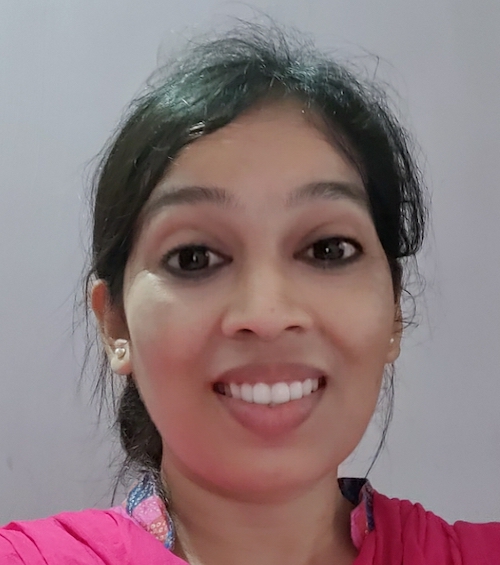 Sujata Jena is a member of the Congregation of the Sacred Hearts of Jesus and Mary. She is a human rights activist, a freelance journalist and an advocate with a special interest for the cause of the poor, Dalits, tribal women, children, minorities and migrants. Since the start of the COVID-19 pandemic, she has been actively involved in the safe return of the migrants and continues to work for their rights through advocacy and lobbying through networking with government administrations and civil society groups. Presently, she is working as the deputy director of the Excellent IAS Academy in Bhubaneswar in the eastern Indian state of Odisha. She is the coordinator of the social projects of the congregation.
Sujata Jena is a member of the Congregation of the Sacred Hearts of Jesus and Mary. She is a human rights activist, a freelance journalist and an advocate with a special interest for the cause of the poor, Dalits, tribal women, children, minorities and migrants. Since the start of the COVID-19 pandemic, she has been actively involved in the safe return of the migrants and continues to work for their rights through advocacy and lobbying through networking with government administrations and civil society groups. Presently, she is working as the deputy director of the Excellent IAS Academy in Bhubaneswar in the eastern Indian state of Odisha. She is the coordinator of the social projects of the congregation.
The COVID-19 pandemic has caused many disruptions and affected every aspect of life.
Besides health outbreaks, bad governance challenges the people of India today. With brute majority power, the government passed three agricultural bills that are detrimental to farmers, people in poverty or who are marginalized, and religious minorities. These violate their fundamental rights. On top of everything, a steep rise in the price of essential commodities is a burden for all.
COVID-19 "has given us a chance to develop new ways of living," Pope Francis said in a message released by the Vatican in September. The church, civil society groups, and individuals reached out to the migrants on foot, the homebound starving poor, and those homeless because of lockdown.
Many of these genuine, kindhearted, selfless individuals inspire me to new and creative ways of witnessing Christ in today's context.
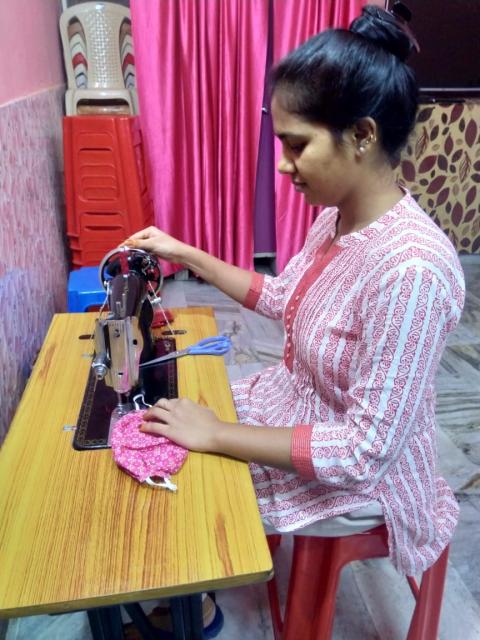
Buli Ranjit, a young kind-hearted girl, stitches masks to share with the needy in her village as Christmas gifts. (Sujata Jena)
The crisis haunted me, urging me to share hope with others, live in solidarity with them, and reach out beyond boundaries — helping, supporting and enabling others, especially those in urgent need. It motivated me to devote my time, energy, gifts, talents and resources in a meaningful way.
With total trust in God, I commit myself to help migrants using every avenue, even taking risks. I am ready to listen to God's voice and respond to the invitations.
Reflecting on Christ's birth affirmed me: the story of God's direct intervention to save sin-laden humanity and the whole creation groaning for salvation; Christmas was a festival of love, sharing joy, peace and hope with family, friends, neighbors, loved ones, and especially the needy. God's invitation for this mission is dearer at this trying time of the pandemic.
I share the same hope and joy for the new year 2021.
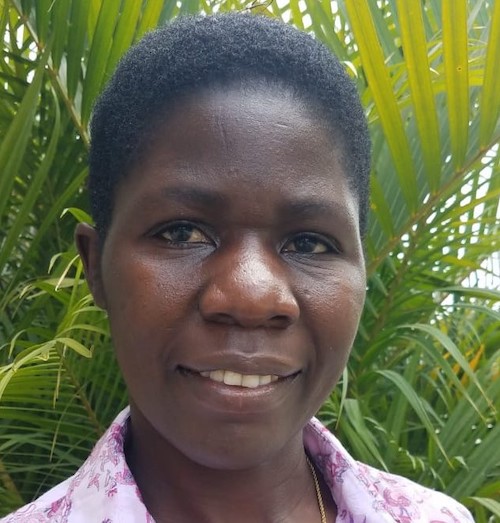 Margaret Grace Nakafu of Uganda is a member of the Medical Missionaries of Mary. With an academic background in sustainable human development as well as HIV counseling and computer science, she has lived and worked in six countries: Uganda, Rwanda, Kenya, Tanzania, Ireland and Honduras. Currently, she ministers in Honduras, doing parish pastoral work, advocating for youth, vulnerable families and the elderly.
Margaret Grace Nakafu of Uganda is a member of the Medical Missionaries of Mary. With an academic background in sustainable human development as well as HIV counseling and computer science, she has lived and worked in six countries: Uganda, Rwanda, Kenya, Tanzania, Ireland and Honduras. Currently, she ministers in Honduras, doing parish pastoral work, advocating for youth, vulnerable families and the elderly.
Our Christian tradition and faith say that when Christ was crucified, his disciples were extremely traumatized by the death of their master and went into hiding (quarantine). I imagine that besides being paralyzed by fear of suffering the same fate as their master, the disciples got bored of waiting!
In our globalized world, a strategic planning of activities (weekly, monthly, yearly) has become part of human life in organizations, institutions, groups, families — even individual life. In January this year, we had our ministry annual planning; I was very enthusiastic about it and came up with an extensive work plan for the youth ministry.
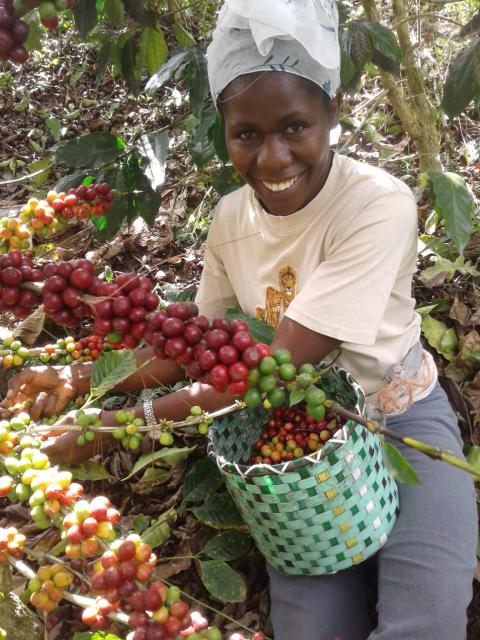
Sr. Margaret Grace Nakafu harvests coffee in Honduras, where she has been a missionary for four years. Coffee was part of her family’s cash crop in Uganda. During her day off, she likes spending time with farm families and coffee harvesting is her favorite relaxing activity. The photo shows God's boundless love and that nature didn't go into quarantine and continues to be bountiful like the persons whose resilience she celebrates. (Provided photo)
Among the activities were youth retreats, but two days before the first retreat, Honduras went on a lockdown because of COVID-19. It was hard to let go of our plans and to find words of consolation for the youth who were so excited about it.
When unforeseen difficulties arise, it can be easy to get caught up in the problem at hand; this can create panic and disconnect us from our bigger goals. We need to sit down and ask: What can I do to be resilient? Are there opportunities for transformation?
So at the end of this year, I want to celebrate:
- God's heart that has continued to love humanity and all of creation for eternity.
- Mother Earth, who, in spite of the damage done to her, continues to be generous in sustaining the ecosystems.
- Children who, in spite of their many unanswered questions, are staying cheerful and playful.
- Parents who, in spite of their fears, continue to be present and hopeful.
- Medical personnel, police, drivers, bankers, pastors, counselors, social workers, volunteers, journalists, farmers, sanitary service providers, teachers and all who, in spite of risks, continue to provide basic services and save lives.
- Political and institutional leaders who, in spite of global panic, continue to search and provide guidance to the general public.
As we come to the end of historic year 2020, whose resilience are you celebrating?
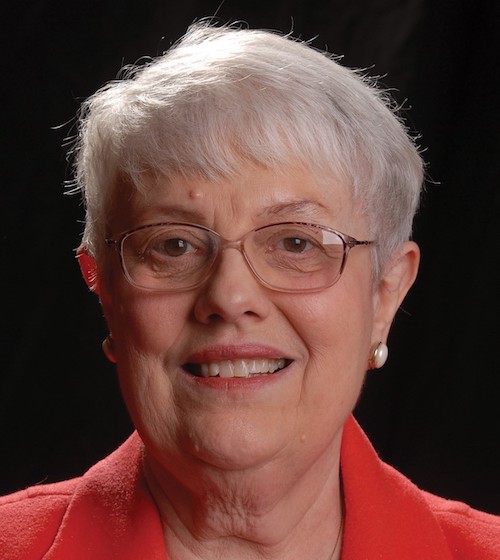 Rita M. Yeasted is a Sister for Christian Community from Pittsburgh, Pennsylvania. After beginning a business career, she entered the Sisters of Divine Providence and became an elementary teacher. Completing graduate work in English, she began teaching high school and college English. In 1987, she transferred to the Sisters for Christian Community and recently completed two terms as one of their team of international communication coordinators. Presently, she is a distinguished professor of English at La Roche University, her alma mater, and still teaches full-time.
Rita M. Yeasted is a Sister for Christian Community from Pittsburgh, Pennsylvania. After beginning a business career, she entered the Sisters of Divine Providence and became an elementary teacher. Completing graduate work in English, she began teaching high school and college English. In 1987, she transferred to the Sisters for Christian Community and recently completed two terms as one of their team of international communication coordinators. Presently, she is a distinguished professor of English at La Roche University, her alma mater, and still teaches full-time.
I vividly remember being with friends in early January 2019 and hearing someone say, "Nobody cares about 2019; we're all waiting for 2020." We thought, wrongly, that nothing could distract us from the November election. But the March lockdown jolted us. COVID-19 absorbed the news, and 2020 became the year we all wanted to end as quickly as possible.
I wrote this on the first Sunday of Advent, a new year liturgically and almost the new year chronologically. The Gospel spoke of watching and waiting, and we watch the infection rates rise and wait for our turn for the vaccine. We have become afraid to leave our homes, shake hands, share a meal with friends or even family. We are masked in public and anxious in private. We hold conversations 6 feet apart. Zoom meetings exhaust us. Unemployment and hunger abound. Our world turned upside-down, and fear is palpable across the land.
This morning, I meditated on other times of fear in my life. I remember fearing my father might die in the war. In elementary school, I feared the atom bomb. In the '60s, we feared assassinations and their effects on the country. In 2008, we feared that a financial crash might be insurmountable. We feared AIDS, Ebola, a SARS epidemic and, now, COVID. Next month, we face a new administration and wonder if the country will ever be able to put aside our differences and embrace our highest aspirations and ideals. We watch and wait.
Yet in meditating on this season and the Christmas story that we annually retell, it struck me that the angels always brought the same message: "Fear not." Gabriel brought the words to Mary. Joseph was told not to fear taking Mary as his wife. The terrified shepherds were told not to fear but rejoice, for the good news brought was for all the people.
When asked recently if I am optimistic about the future, I said, "No, but I'm hopeful." We are optimistic when we see a solution on the horizon. But hope, Abrahamic hope, is reaching for light in utter darkness. We hope when our optimism runs dry. This is a season for hope. Christ, our light, has come. We have nothing to fear. Maranatha. Come, lord Jesus.





